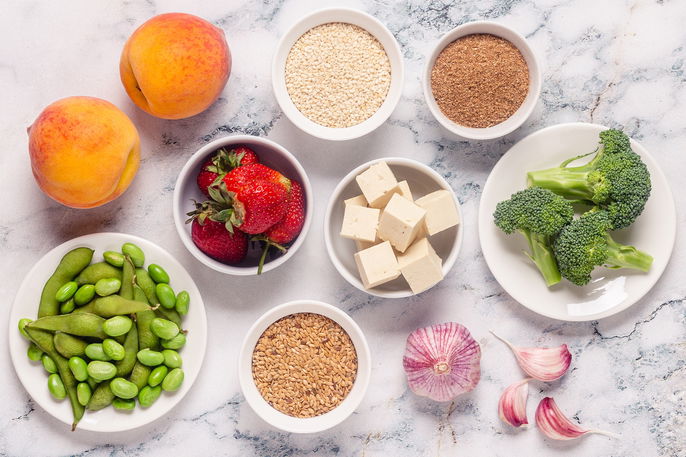Estrogen-boosting foods, like almonds, soybeans, garlic and pistachios, contain a compound referred to as phytoestrogen, which is similar to human estrogen. These foods can therefore be consumed to increase levels of estrogen and optimize the way that they work.
Natural phytoestrogens that are present in foods also contain isoflavones, flavones, terpenoids, quercetins, resveratrol and lignins. These can provide health benfefits like relieving symptoms of menopause and PMS, as well as preventing cardiovascualy disesaes and even cancer.
Consuming estrogen-boosting foods also help to prevent osteoporosis and the onset of diabetes and heart disease. You should ideally consume these foods on a daily basis.

List of food with phytoestrogens
The following table indicates the amount of phytoestrogens in each 100 g of food:
Additionally, other foods that are also rich in phytoestrogens include apples, pomegranates, strawberries, cranberries, grapes, carrots, oats, and wheat germ.
Health benefits
The main health benefits of foods rich in phytoestrogens are:
1. Reducing symptoms of menopause and PMS
Phytoestrogens help alleviate menopausal symptoms, particularly night sweats and hot flashes. Furthermore, phytoestrogens also make it possible to better control the symptoms of premenstrual syndrome, as they balance estrogen levels in the body.
2. Maintaining bone health
Estrogen deficiency during postmenopause increases the risk of osteoporosis. This happens because estrogens are responsible for preventing the action of other hormones that promote bone reabsorption, in addition to preventing the loss of calcium, which keeps bones strong and healthy.
Therefore, eating foods rich in phytoestrogens can be a good strategy to try to balance estrogen levels, preventing osteoporosis.
3. Preventing cardiovascular diseases
Phytoestrogens help prevent cardiovascular diseases because they have antioxidant action, helping to reduce "bad" cholesterol, LDL, preventing the formation of blood clots and improving blood pressure and preventing the formation of plaques.
4. Preventing memory problems
Memory is generally affected after menopause, due to the decrease in estrogen levels in a woman's body. Therefore, consuming foods rich in phytoestrogens can help reduce the risk of Alzheimer's and dementia, as they have neuroprotective and antioxidant effects.
However, more studies are needed to prove the benefits of phytoestrogens in preventing memory problems.
5. Preventing cancer
Phytoestrogens, especially lignans, have anticancer activity because they are rich in antioxidants, helping to reduce inflammation and protect the body's cells against the effects of free radicals.
Phytoestrogens have been linked to a decreased risk of breast, uterine and prostate cancer.
6. Preventing diabetes and obesity
Phytoestrogens stimulate the release of insulin, facilitating the control of blood glucose levels and can therefore prevent the onset of diabetes.
Furthermore, phytoestrogens can also modulate adipose tissue, favoring its reduction and preventing obesity.
Consumption of phytoestrogens by men
There is still no scientific evidence to indicate that the intake of foods rich in phytoestrogens by men causes infertility problems, changes in testosterone levels or reduced semen quality.






























